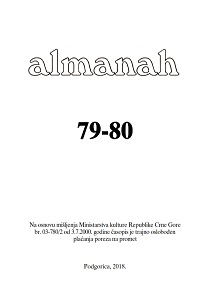Đurumlije iz Sandžaka na Galiciji (1916–1917)
Volunteers from Sanjak in Galicia (1916 – 1917)
Author(s): Redžep ŠkrijeljSubject(s): Civil Society, Military history, Political history, Social history, Pre-WW I & WW I (1900 -1919), The Ottoman Empire
Published by: Almanah
Keywords: Volunteers; Đurumlije; Sanjak; Galicia; Austro-Hungarian; The First World War; British concentration camps;
Summary/Abstract: The low success on the Eastern Front had shown the year of 1916 as the most difficult for Austria-Hungary. The strenghtening of the Antanta which was additionally supported by Italy and Romania resulted in dispersing of the Austrian-Hungarian Army on the fronts, and was forced to fight on multiple theaters of war and needed more manpower. Since Imperial Germany transfered all of its troops to the Western Front, Austria-Hungary was forced to request the company of their Ottoman allies to successfully accomplish their war efforts. The improvement of Austro-Hungarian military positions requested a ruthless war propaganda during the period between the fall of 1916 and the spring of 1917 when the XV Ottoman Corpse containing 10 thousand volunteers and recruits has left for the Galician Front. The Ottoman Military explained their excursion to Galicia as a defensive effort against a possible Russian invasion of the Balkan Peninsula. Circumstances which included bad organization, poor discipline, lack of clothes, hunger, a great number of injured and disabled soldiers, lack of vaccines against infectious diseases affected the moral of the volunteers. The triumphant Ottoman Volunteer Army assissted its European allies by accomplishing secondary war maneuvers at the Galician, Romanian and Macedonian Front which costed them many martyrs and prisoners of war. The extensive documentation from Austrian, German, Yugoslav, Serbian, British and Ottoman archives we can detect a large number of Rumeli Volunteers ending up in British P.O.W. camps which previously joined the intense fightings at the Galician, Caucassus, Dardanelle, Mesopotamian and Arabian war theaters. According to the reports of the Ministry of Foreign Affairs of the Kingdom of Serbs, Croats and Slovenes, a huge portion of them was recruited and deported by the Austro-Hungarian and Bulgarian occupation authorities which deported them to areas of Mesopotamia where they eventually became British prisoners of war. By the end of the war more than 3 thousand Muslim volunteers from Rumelia were deported to Istanbul where they applied to Yugoslav authorities with a request for readmission into their homeland. For these prisoners of war, the difficult war was transformed into a difficult fight for survival and return to their families. Many war veterans have returned to Macedonia, Kosovo and Sanjak wounded, carrying diseases, without material support, food and water. Their return has lasted for many consequent years. A huge number of them were molested and murdered by the Serbian Chetnik formations because of the Ottoman Turkish uniforms they had been wearing. A large portion of the volunteers have returned from the British P.O.W. camps in Egypt burdened by serious physical and psychological trauma.
- Issue Year: 2018
- Issue No: 79-80
- Page Range: 13-56
- Page Count: 44
- Language: Bosnian
- Content File-PDF

